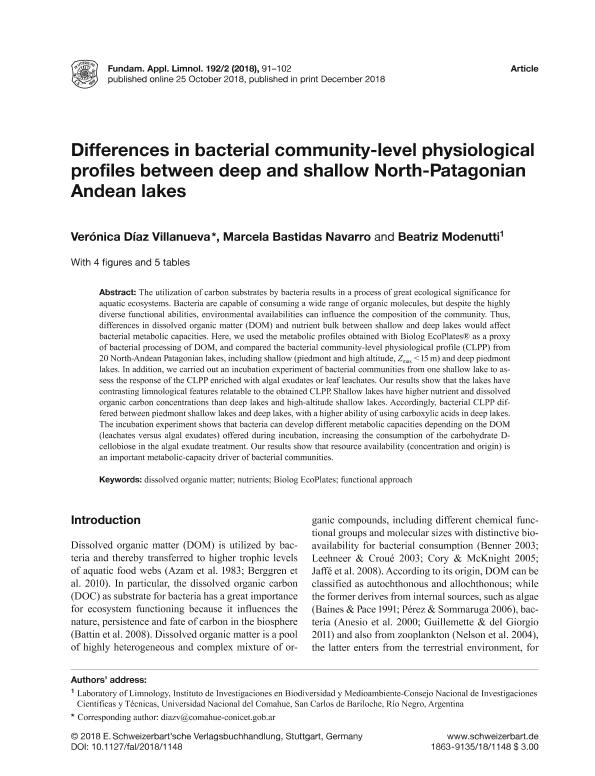Mostrar el registro sencillo del ítem
dc.contributor.author
Diaz Villanueva, Veronica

dc.contributor.author
Bastidas Navarro, Marcela Alejandra

dc.contributor.author
Modenutti, Beatriz Estela

dc.date.available
2020-01-14T21:13:29Z
dc.date.issued
2018-12
dc.identifier.citation
Diaz Villanueva, Veronica; Bastidas Navarro, Marcela Alejandra; Modenutti, Beatriz Estela; Differences in bacterial community-level physiological profiles between deep and shallow north-patagonian Andean lakes; E Schweizerbartsche Verlags; Fundamental and Applied Limnology; 192; 2; 12-2018; 91-102
dc.identifier.issn
1863-9135
dc.identifier.uri
http://hdl.handle.net/11336/94719
dc.description.abstract
The utilization of carbon substrates by bacteria results in a process of great ecological significance for aquatic ecosystems. Bacteria are capable of consuming a wide range of organic molecules, but despite the highly diverse functional abilities, environmental availabilities can influence the composition of the community. Thus, differences in dissolved organic matter (DOM) and nutrient bulk between shallow and deep lakes would affect bacterial metabolic capacities. Here, we used the metabolic profiles obtained with Biolog EcoPlates® as a proxy of bacterial processing of DOM, and compared the bacterial community-level physiological profile (CLPP) from 20 North-Andean Patagonian lakes, including shallow (piedmont and high altitude, Z max < 15 m) and deep piedmont lakes. In addition, we carried out an incubation experiment of bacterial communities from one shallow lake to assess the response of the CLPP enriched with algal exudates or leaf leachates. Our results show that the lakes have contrasting limnological features relatable to the obtained CLPP. Shallow lakes have higher nutrient and dissolved organic carbon concentrations than deep lakes and high-altitude shallow lakes. Accordingly, bacterial CLPP differed between piedmont shallow lakes and deep lakes, with a higher ability of using carboxylic acids in deep lakes. The incubation experiment shows that bacteria can develop different metabolic capacities depending on the DOM (leachates versus algal exudates) offered during incubation, increasing the consumption of the carbohydrate D-cellobiose in the algal exudate treatment. Our results show that resource availability (concentration and origin) is an important metabolic-capacity driver of bacterial communities.
dc.format
application/pdf
dc.language.iso
eng
dc.publisher
E Schweizerbartsche Verlags

dc.rights
info:eu-repo/semantics/openAccess
dc.rights.uri
https://creativecommons.org/licenses/by-nc-sa/2.5/ar/
dc.subject
BIOLOG ECOPLATES
dc.subject
DISSOLVED ORGANIC MATTER
dc.subject
FUNCTIONAL APPROACH
dc.subject
NUTRIENTS
dc.subject.classification
Ecología

dc.subject.classification
Ciencias Biológicas

dc.subject.classification
CIENCIAS NATURALES Y EXACTAS

dc.title
Differences in bacterial community-level physiological profiles between deep and shallow north-patagonian Andean lakes
dc.type
info:eu-repo/semantics/article
dc.type
info:ar-repo/semantics/artículo
dc.type
info:eu-repo/semantics/publishedVersion
dc.date.updated
2019-10-10T13:57:44Z
dc.journal.volume
192
dc.journal.number
2
dc.journal.pagination
91-102
dc.journal.pais
Alemania

dc.journal.ciudad
Stuttgart
dc.description.fil
Fil: Diaz Villanueva, Veronica. Consejo Nacional de Investigaciones Científicas y Técnicas. Centro Científico Tecnológico Conicet - Patagonia Norte. Instituto de Investigaciones en Biodiversidad y Medioambiente. Universidad Nacional del Comahue. Centro Regional Universidad Bariloche. Instituto de Investigaciones en Biodiversidad y Medioambiente; Argentina
dc.description.fil
Fil: Bastidas Navarro, Marcela Alejandra. Consejo Nacional de Investigaciones Científicas y Técnicas. Centro Científico Tecnológico Conicet - Patagonia Norte. Instituto de Investigaciones en Biodiversidad y Medioambiente. Universidad Nacional del Comahue. Centro Regional Universidad Bariloche. Instituto de Investigaciones en Biodiversidad y Medioambiente; Argentina
dc.description.fil
Fil: Modenutti, Beatriz Estela. Consejo Nacional de Investigaciones Científicas y Técnicas. Centro Científico Tecnológico Conicet - Patagonia Norte. Instituto de Investigaciones en Biodiversidad y Medioambiente. Universidad Nacional del Comahue. Centro Regional Universidad Bariloche. Instituto de Investigaciones en Biodiversidad y Medioambiente; Argentina
dc.journal.title
Fundamental and Applied Limnology

dc.relation.alternativeid
info:eu-repo/semantics/altIdentifier/url/http://www.ingentaconnect.com/content/10.1127/fal/2018/1148
dc.relation.alternativeid
info:eu-repo/semantics/altIdentifier/doi/http://dx.doi.org/10.1127/fal/2018/1148
Archivos asociados
